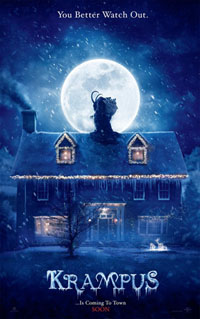Krampus allows comedy and horror to fill the minds of the audience

Krampus, a newly released horror holiday movie gives Christmas cheer some Christmas fear.
December 4, 2015
Krampus, a horned creature from German folklore, who rather than rewarding good kids with presents like Santa Claus, torments children who have been bad, has been pulled into modern times in the new holiday horror, Krampus. In the film, Alex, a preteen still attempting to hold onto his Christmas spirit, gives up hope after being bullied by his redneck cousins and casts his torn up letter to Santa to the icy wind, summoning Krampus and his helpers to wreak havoc on him and his family.
If this sounds campy and overly dramatic, it’s because it purposely is – Krampus never had the intention to take itself seriously. The movie is as much dark comedy as it is horror, which is essential when one of the main antagonistic creatures are a group of animated gingerbread men. The movie is not exceptionally funny, nor exceptionally scary to the average viewer, but the combination of both the elements built off each other, resulting in a much better movie than one which chose to use only one of those aspects alone. However, Krampus is successful at being candidly spooky, as certain scenes carried a viable tension, and the different creatures brought forth by Krampus each has their own flavor of weird.
It was apparent during some of the action scenes that Krampus did not have a large budget for animation, and whether it was that, or the fact that the assailants were, well, demented cookies, those scenes often felt too unreal for the viewer to care all that much. The cast of characters – the overworked father, the aloof older sister, the gun toting uncle – were also all stock white characters who didn’t bring much of anything new to the table, despite some dialogue being admittedly better than a lot of horror movies, or better than what one might expect from Krampus.
However, the outlier to these two faults was Oma, Alex’s German grandmother whose backstory revealed a splendid animation sequence, and whose character shared the same archetype as Yoda, rather than the average grandmother. It is Oma too who reveals the real reason why Krampus came instead of St. Nick. Alex’s loss of Christmas spirit is the result of a problem much bigger than him – the wild frenzy and heartlessness of holiday shopping, the mall Santa scoping out his sister’s behind in the family photo, the cruelness of his family. It’s clear that Krampus did not come because of Alex, he came because society and his family, through spending frenzies and barbarity, have lost sight of Christmas. As Oma said, as Krampus’ hooves on the roof shook the house, “this is all our fault. He’s come for us all.”







